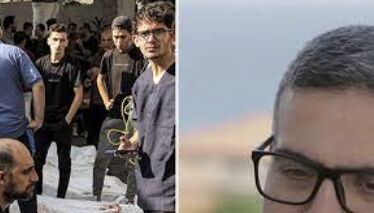British Doctor Trapped in Gaza After Shocking Exclusion from Evacuees List: Urgent Plea for Government Intervention
A British doctor, Ahmed Sabra, was tragically sent back to war-torn Gaza by Egyptian officials after his name was not found on the list of evacuees. Efforts are now underway to secure his safe return.
A British doctor, Ahmed Sabra, who had managed to escape the war-torn Gaza was tragically sent back to the strip by Egyptian officials after his name was not found on the list of evacuees. This shocking development came to light through the efforts of Geraint Davies, a Member of Parliament representing Swansea West in Wales, where Sabra lives and works as a National Health Service consultant. Davies shared video footage and voice notes where Sabra recounted the dangerous journey he undertook with his wife and children in an attempt to reach safety at the Rafah crossing into Egypt.
While Sabra's family was permitted to pass through, he was denied entry as his name was not included on the approved list of foreign nationals. Sabra expressed his anguish in a video, stating that this decision was nothing short of a death sentence. He made a heartfelt plea to the British government to fulfill its duty and evacuate him and other British nationals to ensure their safety and enable them to return home.
Davies expressed his deep concern for Sabra's situation, highlighting that he and the doctor were unaware of the reasons behind his exclusion from the list. He has taken the matter up with the UK Foreign Office, urging them to take immediate action to address the critical situation and secure Sabra's safety with his family. The MP emphasized that Sabra has been left stranded in a dangerous environment without shelter, limited phone charge, and access to data. He called upon the Foreign, Commonwealth & Development Office (FCDO) to utilize all resources available to bring Sabra back home from the perilous danger he currently faces.
Sabra also detailed his experience in the video and voice messages, disclosing that he and three other British nationals had spent an excruciating two and a half days at the border, anticipating intervention from the British embassy. While he was provided with temporary provisions such as food, drinks, and a sleeping arrangement on a sofa, he was ultimately forced to board a bus that transported him back to Gaza.
The UK Foreign Office responded to the situation, stating that they are diligently working around the clock to facilitate the safe evacuation of all British nationals in Gaza who wish to leave. They clarified that the evacuation process involves submitting the necessary details of British nationals and eligible dependents to Israeli and Egyptian authorities, who then review the cases and authorize permissions to cross. However, the statement notably made no reference to Sabra's specific case. CNN reached out to the British Embassy in Egypt for comment, but no response has been received at the time of reporting.
The urgency of the situation has spurred more than 4,800 individuals to sign an online petition, calling on British authorities to expedite efforts to evacuate Sabra. The British Islamic Medical Association has also released a statement demanding the swift evacuation of Dr. Sabra and other British nationals trapped in Gaza. According to British Foreign Office Minister Andrew Mitchell, over 150 British nationals have left Gaza for Egypt via the Rafah crossing since the opening of the border on November 1. In total, more than 2,000 foreigners have been successfully evacuated from Gaza during this period.
Despite these numbers, it is imperative that swift action is taken to ensure the safety of individuals like Dr. Sabra who have been inadvertently left behind in such dangerous circumstances. The UK Foreign Office's ongoing efforts to address the situation and ensure the safety of British nationals in Gaza cannot be understated. It is crucial that they continue to work tirelessly to rectify the grave error that led to Dr. Sabra's exclusion from the evacuees list. The British government must prioritize the well-being and security of its citizens, sparing no effort to ensure their swift return home and protection from the ongoing conflicts in the region.




